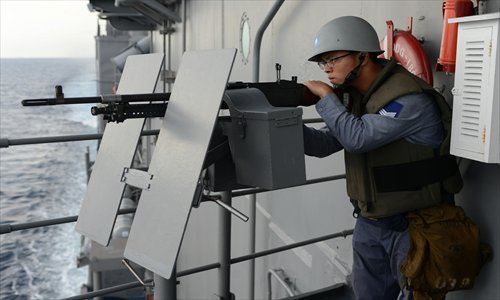Taiwan bans Filipino labor

Taiwan on Wednesday announced a second wave of sanctions targeting Manila after it rejected an "insincere" Philippine apology and decided to freeze applications by Filipinos to work on the island and recalled its representative to the Philippines.
The sanctions came in response to the Philippine Coast Guard's fatal shooting of 65-year-old Taiwanese fisherman Hung Shih-cheng on May 9.
The decisions came after Philippine Presidential spokesman Edwin Lacierda said Wednesday the country's president Benigno Aquino had sent the chairman of the Manila Economic and Cultural Office (MECO), which handles affairs related to Taiwan, to the island to make an apology.
"The President has appointed MECO Chairman Amadeo Perez as his personal representative who will convey his and the Filipino people's deep regret and apology to the family of Mr. Hung Shi-cheng as well as to the people of Taiwan over the unfortunate and unintended loss of life," Lacierda said in a statement.
But Jiang Yi-huah, chief of Taiwan's executive body, said it was unacceptable that the apology came from the "people of the Philippines" rather than the government as it was the coastguard that was responsible for the shooting.
"Perez did not have sufficient authorization and this shows the Philippines' lack of sincerity in resolving the incident and therefore our second wave of eight sanctions are initiated immediately," Jiang told reporters.
These include a "red" travel alert urging Taiwanese not to visit the Philippines and the suspension of exchanges between high-level officials, as well as a halt to exchanges on trade and academic affairs.
A spokeswoman for Taiwan's leader Ma Ying-jeou also said Wednesday that they were strongly dissatisfied with the Philippine response to the incident, rejecting the apology as "inadequate."
Ma "expressed his strong dissatisfaction over the Philippines' lack of sufficient sincerity and its inconsistent attitude," spokeswoman Lee Chia-fei said, adding that he would recall Taipei's envoy to Manila.
Taiwan demands a formal apology from Manila, an investigation into the fisherman's death, punishment for those responsible and compensation for the death and the damage done to the fishing boat.
In Beijing, State Council Taiwan Affairs Office spokesman Yang Yi told reporters that China demanded that the Philippine government conduct a thorough investigation into the killing of the Taiwan fisherman.
"We have repeatedly condemned the violent killing of the innocent fisherman since the incident happened. We have demanded that the Philippine side take the case seriously, find out the truth as quickly as possible and punish those responsible," Yang said.
Tsai Pao-hsing, head of a local fishery organization, which Hung's fishing boat is registered with, told the Global Times that he also did not think the Philippine apology was sincere. He said he hoped Taiwan authorities could continue their protection of Taiwanese fishing boats before Taipei and Manila reach any fishing agreements.
Tsai said Taiwan should exert more pressure over the Philippines to meet its demands and the announced countermeasures should be sustained.
Analysts believed the ban of Philippine worker applications to Taiwan could deal a blow to the Philippine economy as its overseas workforce is believed to account for as much as 11 percent of the Philippine GDP, with an estimated 10 percent of the Philippines' population of 92 million now working abroad.
There are now about 120,000 Filipino workers in Taiwan and the island receives around 3,000 new applications from the Philippines each month.
"The measures announced by Taiwan against the Philippines are all very strong measures which will be hard for Manila to accept," said Zhuang Guotu, dean of the Research School of Southeast Asian Studies at Xiamen University. He said whether the situation eases is up to the Philippines' next move.
Su Hao, director of the Asia-Pacific Research Center at the China Foreign Affairs University, said the Philippines has miscalculated the situation. "Manila did not expect such a tough stance from Taiwan on the issue, believing that since the two sides have a special relationship with the US, Taiwan's response would be moderate," Su told the Global Times.
"It is possible that the Philippines will make some conciliatory gestures to alleviate pressure, but its totally agreeing to Taiwan's demands is unlikely," he added.
Agencies contributed to this story